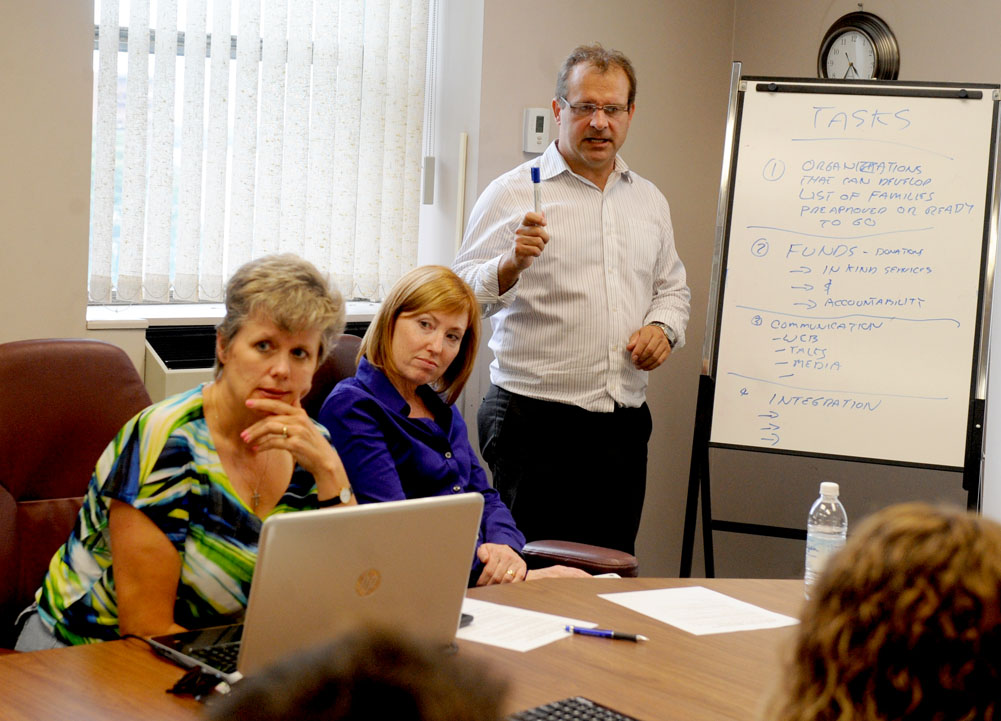
(Mayor David Henderson writes ideas on the whiteboard Monday while Rev. Marianne Emig Munro, left, of First Presbyterian Church, and Rev. Kimberly Heath, of Wall Street United Church, listen.)
One week into the local community's response to the refugee crisis prompted in large part by the Syrian civil war, what truly stands out is just how civilian the whole thing is.
In my line of work, “civilian” does not mean non-military, but rather non-official: People who are not trained, generally speaking, to do battle in that arena generally circumscribed by media coverage.
In this group one can include, again generally speaking, members of the clergy, some of the folks who toil away in local agencies, and unaffiliated individuals.
Which describes pretty much everyone who has shown up, so far, to meetings of the hastily-formed local committee aimed at helping resettle refugees here, leaving the politicians and officials involved in a definite minority.
Two of these civilians have caught my attention in particular. There's Michelle Jones, who introduced herself at the first meeting as “a human being and a mother.”
She urged every church in the community to take in one refugee family, adding that, “at the end of the day, we'll be richer.”
At the second meeting, Jones referred to previous generations that had sacrificed a great deal to achieve great things and said taking in these people in need of lifesaving help is “our chance to be that generation.”
Your non-civilian, trained politician, at least in Canada, tends to use that kind of eloquence only sparingly. It was a pleasure to hear it used boldly and without regard to caution.
Then there is Kyla Smith, a local student who is putting her Master's studies on Canada's refugee system to good use with this local effort.
Her ability to be direct goes beyond refreshing to outright charming. She brought some rare levity to last Thursday's meeting by pointing to one challenge Middle Eastern refugees will face once they're here.
“It's a fairly waspish community and if you're vaguely different you're going to stick out,” she said.
Both these women, not beholden to any organization, have stepped forward, not only in the larger meetings but also as part of the smaller, get-it-done organizing group that rolled up its sleeves Monday afternoon.
And that is why this refugee effort is likely to yield results: The impulse to help people half a planet away, to make a small dent in the problem that has caused dead children to wash up on beaches, is being driven by these civilians.
This may have been started at the top of the community chain, by Mayor David Henderson reacting to a Twitter discussion and calling a meeting, but the fact his initial “round table” became a circle of such wide diameter indicates just how deeply sunk into the population was this urge to do something.
Since then, Henderson has run these meetings by offering suggestions, urging it to punch above its weight and condensing other people's ideas, but also by acting as a facilitator: The guy at the whiteboard collecting and writing down other people's suggestions.
As pastors, priests and the public have stepped up, he has often done the wise thing and kept out of their way.
These grassroots-up efforts are a wonder to watch when they grow this quickly.
These folks are up against a great many obstacles, and the end result may well be far less than they would have hoped, but still, these meetings leave one optimistic that there will in fact be results.
Right now, one can only be proud of this community.